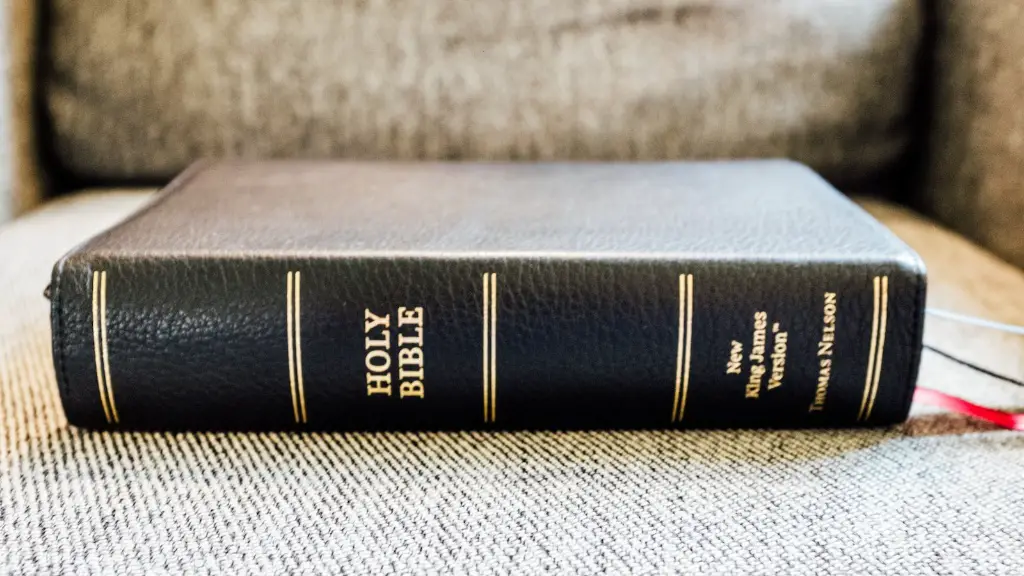Who Is Salome In The Bible
The name Salome occurs in the New Testament of the Bible, and it refers to the daughter of Herodias and the stepdaughter of Herod. Although the story of Salome is short, she is one of the most controversial figures in the Bible given her close association with the beheading of John the Baptist – a story that has fascinated people for centuries. This article will discuss who Salome was in the Bible, along with her role in the death of John the Baptist.
Before looking at Salome’s role in the beheading of John the Baptist, it is important to delve into her backstory. While her mother is not named in the Bible, Salome is said to have been the daughter of Herodias, who was the first wife of Herod the Great before he divorced her and married another woman. Salome’s mother is said to have sought revenge on John the Baptist who was preaching against her.
It is believed that Salome was about 15-years old during the events that are narrated in the Bible. Although Matthew 14:6 does not mention Salome by name, it does reference Herodias as the mother of Salome which tells us that Salome was the dancing girl who pleased Herod. This event quickly led to the death of John the Baptist—Salome’s mother had commanded her to request his head as a reward for her dance.
In the Gospel of Mark, there is a different version of the events—mark does not name the girl who danced for Herod but instead states that “Herodias’ own daughter came in and danced, and pleased Herod and his guests” (Mark 6:22). This verse indicates that Salome was the one that pleased Herod, and as a result, her mother asked her to demand John the Baptist’s head in return.
The story of Salome has been the focus of much debate—many religious commentators and scholars are still not sure why all of this happened, and why Salome obeyed her mother’s command. Some people believe that Salome was a naive young girl, who was manipulated and coerced into complying with her mother’s wishes. In contrast, others believe that Salome was an ambitious and power-hungry girl who was willing to do anything to become powerful and secure her spot in Herod’s court – even if it meant the death of John the Baptist.
Whatever the true story is behind Salome and the beheading of John the Baptist, one thing is certain: the story illustrates how power and influence can have a dangerous effect on people’s decisions and behavior. Salome’s decision to obey her mother’s request cost a man with an important message his life. As a result, we must be aware of the power we are given and make sure that it is not misused or abused.
The Controversy Around Salome
Modern interpretations of the story of Salome have provoked much controversy – especially given her close association with a man who was killed for his beliefs. In the 19th century, Salome had been frequently seen as an embodiment of feminine beauty, self-indulgence, and lust. However, this interpretation changed in the 20th century – especially with the rise of feminism which has seen Salome portrayed as a young girl who had been manipulated and coerced by her mother (Herodias).
The story of Salome has been used to illustrate the importance of freedom of religion and expression. People of faith and non-faith communities alike realize that the right of people to practice and express their religious or spiritual beliefs must be respected and protected, so as to prevent a tragedy like the beheading of John the Baptist from occurring.
At the same time, the story of Salome has also been used to encourage young girls not to get caught up in power struggles, and to remain strong in the face of injustice. Women and girls should be encouraged to stand up for what is right and make sure that their voices are heard. In a world where people are often judged for their background or beliefs, Salome’s story serves as an important reminder that we must not allow ourselves to be silenced.
Finally, although it is essential to learn from Salome’s story, it is also important to realize that this story reflects the values of the time and should not be judged by modern day standards. No matter what happened in the past, it is essential to have respect for the beliefs and values of different religious and spiritual traditions.
The Significance Of Salome Today
The story of Salome has had a long history of retelling, and it continues to have relevance today. In some of the more contemporary retellings of the story, Salome is not seen as an evil or conniving figure, but as a young girl whose story has been used to illustrate the importance of religious freedom. As such, she serves as an important example of why it is essential to protect religious and spiritual freedoms in society.
At the same time, the story of Salome has also been used to highlight the importance of gender equality and women’s empowerment. In some interpretations of the story, Salome is seen as a woman whose innocence and youth were exploited by a cruel and oppressive system – a situation which continues to be relevant today. The story of Salome serves as an important reminder of why it is essential to respect and protect women’s rights, and to ensure that people are not judged or oppressed for their gender, religion or beliefs.
Finally, the story of Salome has also been used to illustrate the importance of standing up for what is right, and not allowing oneself to be manipulated or controlled by people in power. In a world where so many people are afraid to stand up for their beliefs and values, the story of Salome serves as an important example of why it is essential to remain strong and to fight for justice.
How To Interpret The Story Of Salome
Given the varying interpretations of Salome’s story, it can be difficult to determine the right way to interpret her role in the Bible. However, it is important to realize that Salome should not be viewed as an evil figure, but as a young girl who had little power and control over the situation she was in. As such, the correct way to view her role in the story is as a victim and a symbol of the danger and oppression associated with unchecked power.
At the same time, it is also essential not to forget the religious and spiritual implications of the story. The fact that John the Baptist was preaching against the powers that be when he was executed serves as an important reminder of the importance of religious freedom, and why it must be respected and protected.
The story of Salome serves as an important reminder of the importance of rational thinking and critical thought. While it may be difficult to make sense of the actions of Herodias and Salome, it is essential to remember that all actions have consequences and that we must think carefully before we make decisions.
Finally, the story of Salome can be interpreted as a warning about the dangers of unchecked power. Power must be used for the greater good, and people who are part of positions of power must not abuse their position. In a world filled with injustice and oppression, the story of Salome serves as an important reminder of why it is essential to stand up for what is right.
The Legacy Of Salome
Salome’s story continues to have relevance in today’s world – particularly in regards to religious freedom, gender equality, and the dangers of unchecked power. Throughout her life, Salome has been both a source of fascination and cautionary tale – a reminder that religious and spiritual freedoms must be respected and defended, and that power must be used responsibly.
Today, Salome’s story is also used to encourage young women to stand up for what is right, and to not let themselves be controlled by people in power. Salome’s story is a reminder of the importance of remaining strong in the face of injustice and oppression, and of the importance of respecting and protecting the rights of all people – regardless of religion or gender.
In sum, the story of Salome is a powerful reminder of why it is essential to respect and defend the rights of others – we must remember that injustice and oppression are never acceptable, and that we have a responsibility to stand up for what is right and stand together against injustice and intolerance.
Pop Culture Influence of Salome
Over the years, the story of Salome has been used in many forms of pop culture – including in various art forms, books, film, and television. The classic Wilde play “Salome” served to popularize her story and reinterpreted her as a vengeful, selfish, and lustful character.
The story of Salome has also recently been featured in popular television series such as “Game of Thrones”, where her character is depicted as a powerful, ambitious, and dangerous figure. These modern day interpretations of Salome help to illustrate how her story is still relevant in today’s world and how it can still be used to explore the idea of unchecked power, gender, and religious oppression.
At the same time, Salome has also been featured in other forms of entertainment such as music, ballet, and opera. These forms of entertainment aim to reinterpret her story and draw attention to the themes of the oppression of women, unchecked power, and the importance of religious freedom.
The story of Salome has also been explored in literature in various forms – including in classic novels such as “Oscar Wilde’s Salome”, “Roxana”, and “Salome”. These works help to provide a fresh perspective on Salome’s story and allow readers to engage with her character in a different way.
Finally, the story of Salome has also been used in contemporary art forms such as visual arts – with paintings and sculptures depicting her as a powerful and dangerous figure. These artworks serve as a reminder of the power of Salome’s story and the impact it continues to have on modern day society.
Conclusion
The story of Salome is one of the most controversial and powerful stories in the Bible. Throughout the centuries, her story has been interpreted in many different ways – a story of a naive young girl, a tragic victim, and a warning about the dangers of power. Today, her story continues to be relevant, and it is used to illustrate the importance of standing up to oppression, respecting religious freedoms, and standing up for what is right.





